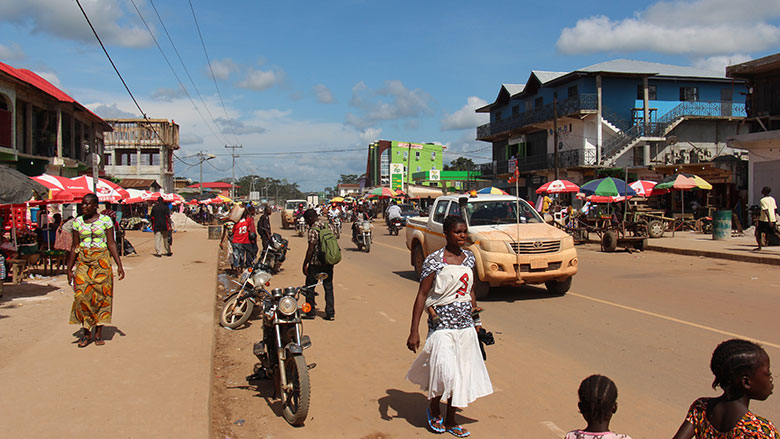MONROVIA, February 13, 2017 –With support of the World Bank and other development partners, major road corridors are being rehabilitated to foster economic development of rural Liberia. The newly rehabilitated roads which connect urban to rural areas have significantly reduced travel time, and increased vehicular movement along those routes, making access to markets, educational institutions, hospitals and other social services critical for economic growth and development of Liberia easier.
The Liberia Road Asset Management Project (LIBRAMP) was designed to help reduce transport time and cost along the 246-kilometer Suakoko Highway linking Liberia’s capital, Monrovia, with Gbarnga and the Guinea border. There is an uninterrupted movement of goods and services. The International Development Association (IDA), the Bank’s fund for the poorest countries, is supporting the re-establishment of Liberia’s basic transportation infrastructure along this corridor and supporting the path to economic growth.
The completion of the road is boosting trade and commerce in rural Liberia. Farmers are happy that they can easily get their produce to markets, while traders can now easily truck commodities from the capital.
“There have been lots of changes in improving our livelihood; the new road is far better than before because it gives us a shorter time to get our goods to marker and it avoids our goods from perishing before getting them to market,” said farmer Jefferson Togbah of the Dokodan Farmers Cooperative Society. He added that it is now possible to leave his farm and travel to Monrovia and return the same day, which is good for marketing purposes.
The Suakoko Highway runs through Ganta, a commercial hub in Nimba County, leading to the Guinea border. Known as the city that never sleeps, Ganta is a transit point for those traveling to and from southeastern Liberia, Ivory Coast and Guinea. Commuters depend largely on Ganta for food, accommodation and entertainment.
After the construction of the Suakoko Highway, Ganta’s infrastructural development greatly improved, paving the way for the construction of new and improved hotels, shopping and entertainment centers. Trade and commerce have been greatly improved owing to new road. As a result of the conducive business environment, Ganta is booming, attracting people from Monrovia to hold retreats, seminars and other businesses.
Ganta’s infrastructural development was accelerated because compensation for project affected properties paid has been invested in new structures and businesses, and livelihoods have been restored and improved. These project affected persons who benefitted from resettlement payment have shown greater appreciation and the local economy is being greatly revitalized.
“The Bank’s contribution in the financing of this road corridor demonstrates our commitment as a true partner to the people of Liberia, to enhance connectivity and, thus, reduce poverty and promote shared growth and prosperity,” said Larisa Leshchenko, World Bank country manager for Liberia.
In addition to the Bank’s contribution, a multi-donor trust fund for infrastructure, Liberia Reconstruction Trust Fund (LRTF), was put into place to muster support for Liberia’s damaged infrastructure. The LRFT is supported by contributions from the European Union, and the governments of Great Britain, Sweden, Ireland, Norway and Germany, and the World Bank. The LRTF is administered by the World Bank and supervised by an Oversight Committee comprising the Government of Liberia, contributing donors, and the World Bank.
Road Maintenance
The project also provides for the maintenance of the road over its 10-year period, contributing to the employment for more than 1,400 Liberians annually, some of whom acquired technical skills for future employment.
The World Bank and LRTF partners have committed around $400 million to ongoing transport projects in Liberia. These projects, collectively managed as a program, have financed the rehabilitation of over 500 kilometers of paved roads, representing about 60% of total paved network of roads in Liberia.

